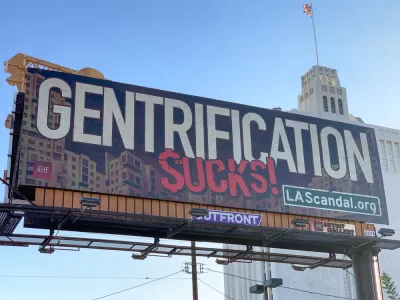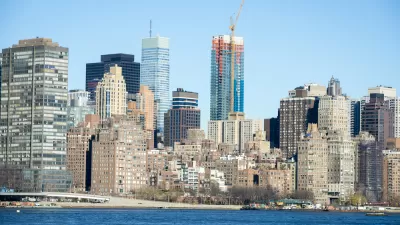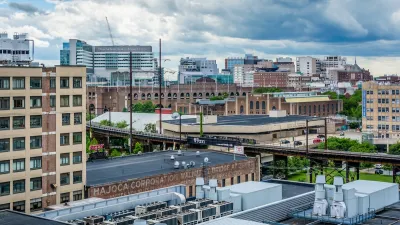Most likely, no one in particular—but policy changes can alleviate the housing shortage and prevent displacement.

As more neighborhoods and cities experience the impact of redevelopment, often termed gentrification, people seek individual culprits to pin the blame on. Whether it is the owners of the hip new coffeeshop, the developer building that new building, or the young professionals renting or buying homes in previously undesirable neighborhoods, the human need for attribution leads us to discount broader, institutional forces, according to Alan Ehrenhalt’s recent piece in Governing.
While “yuppies” or “hipsters,” whatever the term du jour is, are an easy target—“Most seriously, they raise rents and property taxes and inevitably force some poorer inhabitants to look elsewhere for lodging”—Ehrenhalt argues that “To hold them responsible for the discomforts of gentrification is essentially to blame the customer.”
Gentrification’s suppliers, Ehrenhalt writes, are indeed real estate companies and developers. “Yet for developers and landlords to be the true villains of gentrification, it would be necessary to determine that they are worse stewards than the small property owners who dominated poor neighborhoods in pre-gentrification days. There is no real evidence that this is the case.”
The real problem, according to Ehrenhalt, is the shortage of affordable housing supply and construction. “It’s the fault of an entrenched and complex system that has existed for decades and doesn’t have a perpetrator to put the finger on.”
To Ehrenhalt, “The only way to make a serious dent in the shortage of moderately priced housing is to encourage more of it without demonizing the people living comfortably under the current rules.”
While eliminating single-family zoning and permitting light density increases is one avenue for creating more housing, these policies probably won’t make a significant dent in the million of housing units needed to alleviate the current shortage. Ehrenhalt concludes, “To me, the only practical zoning solution is to stick to commercial corridors, and to build big there — tall apartment buildings, not duplexes or fourplexes” near transit lines that can accommodate families.
FULL STORY: Gentrification and the Search for Villains

Manufactured Crisis: Losing the Nation’s Largest Source of Unsubsidized Affordable Housing
Manufactured housing communities have long been an affordable housing option for millions of people living in the U.S., but that affordability is disappearing rapidly. How did we get here?

Americans May Be Stuck — But Why?
Americans are moving a lot less than they once did, and that is a problem. While Yoni Applebaum, in his highly-publicized article Stuck, gets the reasons badly wrong, it's still important to ask: why are we moving so much less than before?

Using Old Oil and Gas Wells for Green Energy Storage
Penn State researchers have found that repurposing abandoned oil and gas wells for geothermal-assisted compressed-air energy storage can boost efficiency, reduce environmental risks, and support clean energy and job transitions.

Minneapolis Bans Rent-Setting Software
Four cities have enacted restrictions on algorithmic software that can inflate rent costs.

Oakland to Add 244 New EV Chargers
Oakland plans to launch its new charging network at eight locations by the end of 2025.

Jane Goodall Inspires with Message of Hope, Resilience, and Environmental Action
Speaking in Pasadena, Jane Goodall offered a hopeful and inspirational message, urging global compassion, environmental responsibility, and the power of individual action to shape a better future.
Urban Design for Planners 1: Software Tools
This six-course series explores essential urban design concepts using open source software and equips planners with the tools they need to participate fully in the urban design process.
Planning for Universal Design
Learn the tools for implementing Universal Design in planning regulations.
Heyer Gruel & Associates PA
City of Moreno Valley
Institute for Housing and Urban Development Studies (IHS)
City of Grandview
Harvard GSD Executive Education
Salt Lake City
NYU Wagner Graduate School of Public Service
City of Cambridge, Maryland





























